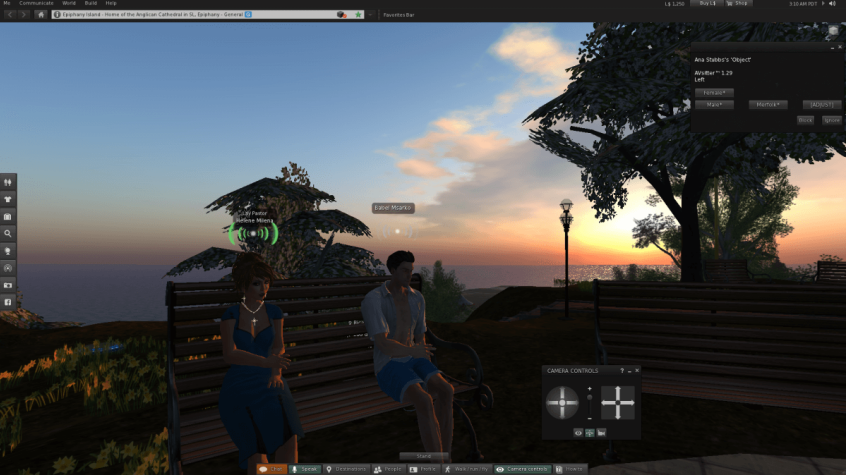
I'm outside the cathedral having a few problems with my body. Currently it's a white cloud, which is far from optimum when it comes to meeting new people. To be fair, the wistful freedom of this stratocumulus form has its charms and I do feel a strong desire to float high o'er a few hills and vales, but interviewing people when you can't keep eye contact – due to having no discernible appendages – lacks professionalism.
The reason for my corporeal difficulties turns out to be age-related. It's been several years since I last set foot on Epiphany Island, an online virtual world which is home to the Anglican Cathedral of Second Life, and in that time the template for my previous incarnation has been deleted and replaced with shinier, new upgrades. If having a mid-life crisis in real life wasn't bad enough, now fictional versions of myself are deemed substandard. This wasn't the welcome I'd hoped for. Thankfully the contact I'm meeting is used to these kind of problems.
"There's one person who attends the Cathedral who I've only seen as a non-cloud once," says Helene Milena, Lay Pastor at the Cathedral. In fact this isn't even the most unusual avatar likely to be here today. "We used to have a hippo that worshipped with us quite a lot," says Helene, "the church warden's a mermaid...and another regular's favourite avatar is a parrot. There's a perch over there, that's for him."
I resolve my body issues and we both sit down on benches by a fountain outside the Cathedral building. Behind us the sun is low on the horizon, its rays glinting soothingly on the rippling ocean that surrounds the island. Cats appear at our feet, playfully moving between us while their purrs join the birdsong drifting down from the trees. It's calming, beautiful, and playing havoc with my voice recorder.
"You might find you'll get a better recording if you turn down all the other extraneous noises," Helene advises. I duly comply and silence falls. This one feature alone would make any real life church immediately 100 times better.
I last spoke with Helene (or Ailsa Wright in real life) about six years ago when I was writing a feature for Wired about the rise of online churches. Back then everything looked so exciting and revolutionary. People from all over the world could meet together and worship in a virtual space, free from judgment about physical appearance or the restrictions that disabilities or distance could bring. It sounded wonderful, utopian even, and the unstoppable rise of technology in everyday life suggested that it could become a movement of huge significance. Now, with more people online than ever before, has the dream truly become a reality?
"It's become less novel," says Helene. "Certainly our numbers here at the Cathedral, in terms of attendance, have gone down quite significantly. I've noticed that some well established churches have folded in Second Life, or they've downgraded their amount of land. I wouldn't say that all is necessarily well."
In truth, I'd feared this might be the reality. When Second Life was first launched back in 2003 it was something very new. For a while people even struggled to know what the point of it was. After all there was no goal, no way to win; it was life but digital. This ability to build an alternative version of oneself had tremendous appeal for many users and saw the service grow at an impressive rate. Now, in an age where mobile phones and tablets have replaced the desktop computer for a large proportion of people, the technical requirements and clumsy mechanics of this virtual world seem...old.
Helene continues: "Second Life is not as popular as it once was. I remember some years back, when I logged on you'd have maybe 60,000 people in the world at one time. Now, it's normally closer to 40,000."
Technical reasons apart, the transient nature of online communities – one of the main reservations that a lot of commentators always brought up when debating online churches – also plays its part. If a friend doesn't turn up to a physical church for a few weeks, then there's the chance someone might call round to see if they're OK, or maybe even meet them somewhere. Online this is a lot harder to do. Emails are easier to dodge than someone coming up and saying hello in Tescos.
"People do come back," explains Helene. "We had someone on Sunday who hadn't been here for a year, so there is that sense of attachment to the place. But life gets in the way. They get busy, things happen. I couldn't be here as often as I am unless I build my life around this, which is a crazy thing to have to do, but it's the way I have to do it to ensure that I'm here. There's still a huge amount of need, and I think it's a need that online church can address better than many other situations. People can find help when they're not necessarily connected with an offline church, or don't feel safe talking about something. There's still that advantage of anonymity here, where you can share your heart with someone and not bump into them in the street.'
Interestingly, it isn't only Second Life churches that are seeing these hardships. While the platform may be as much a barrier as it is an advantage, more traditional online ventures are finding similar difficulties in terms of community. Working my way through contacts from my previous research I find a string of broken links, holding pages, or sites that look exactly the same way they did five or six years ago – which isn't a good thing. I feel like I'm in some American Midwest small town, where the shop fronts are boarded up and the grizzled drawl of Bruce Springsteen haunts the air.
I visit the London Internet Church, which should be a bustling metropolitan collective with a title like that. Actually it turns out to be a web-based extension of the Parish Church of Stephen Walbrook, which can be found around the back of Cannon Street station. The website is clean, orderly, and provides links to pre-recorded sermons, Eucharist services and night prayer. Clicking on one of these acts as a magical time machine that transports me back to Sunday morning television in the 80s, when I'd managed to fake illness and stay home from church only to find it on the telly in all its achingly slow glory. It seems that now, 30 years later, Christianity still isn't a spectator sport. Of course this is all down to a matter of stylistic preference, and the London Internet Church does receive more visitors per day than most churches in the UK.
"We reach people literally around the world," reveals Paul De Ridder, who runs the LIC. "We have around 30,000 visitors a month, 1,000 a day, who visit the church. Now of course some will spend one second, but others will be here longer."
LIC runs on a skeleton staff of dedicated volunteers and a tiny budget, something that is a common story in the age of digital faith. The site also has a community forum where people can discuss issues, moderated by another volunteer. It's a solid, gentle presence on the net that obviously meets a need, but it somehow lacks the dynamic, community based hive of activity that I hoped would have appeared online by now. It feels more akin to a midweek meeting in a small parish church, rather than a global movement.
And in many ways that's the problem. I'm looking for a super modern church that matches many of the aspects of my normal one, but in a medium where those things just don't make as much sense. You see, real-world churches exist the way they do because they match the behaviour of people. We need a communal place to gather, therefore a building is sensible. Meetings happen at set times so we can actually take part together, and prayer support usually happens outside these gatherings to stop the whole thing grinding to a halt. Plus, probably the most defining aspect, is the truth that we want people to stay with us, be regular members, and not wander nomadically wherever the mood takes them. But online, well, things are a little different.
It was only a few years ago that a desktop computer would have been the primary way for most people to access the internet. In essence it was a place to go where you would sit and experience the online world. Now, with the explosion of mobile devices, you're far more likely to explore the web when you're on the bus, in a coffee shop, waiting to pick up the kids, or on the sofa. The interactions are typically short and come from a range of sources. So the future of digital churches seems more likely to conform to that sort of open, dispersed nature of use rather than the gathered, centralised site that previously seemed so appealing.
"I will go on hundreds of web pages a week," says Pam Smith, web pastor at i-Church and author of the book Online Mission and Ministry. "I'll have a look, then I won't go back, because I just wanted to read that one article. That's just how people behave online, and to make your primary aim to make people behave differently is not the main issue of being there as a Christian community. It's a question of looking at what's available over all."
This idea of sharing a congregation is one that is definitely at odds with traditional church. Sadly it's not uncommon to find that promoting one's 'rivals' is something that is quietly avoided for fear of losing parishioners. Having a parish the size of the internet though, well that gives you some leeway.
"The lesson I've learned is that there are a lot of Christians doing things online, so there's no point in reinventing the wheel every time," Pam says. "I could say 'let's do a podcast' because everyone is doing podcasts, but if somebody is already doing it really well, why not just point people to that? This is the essence of being online. There's a networking ethos that you will direct people to other sites, and you hope other sites will direct people to you. It's this sort of thing that I would like to see more of with Christians, knowing what's available online and not just trying to get everybody to pile onto your thing. You're just trying to connect people with the things that they need."
Of course this buffet style of faith has long been questioned by those who doubt the validity of online churches. But as the platform develops and matures, lessons about how people interact and use web-based services become more informed. When the wider community shares its resources it can provide support, pastoral duties, answer searching questions and help meet the deep needs of those who find themselves outside a physical fellowship. The international nature also means that for those in countries where Christianity is a crime, a portal to other believers can also be a tremendous encouragement. As a direct replacement for traditional congregations though, it seems that the online model hasn't really found its feet.
"I remember there was a lot of discussion about the incarnational nature of online church," explains Nicola David, who runs Church on the Net. "How it couldn't be church because it wasn't physical; how you couldn't do the sacraments online etc. Then there was talk of people doing baptisms online, weddings online, communion online. I have to say, I don't feel comfortable with that. I think we're meant to be a real physical body, and I only ever saw Church on the Net as a stepping stone to real life church. Some online churches say 'no, we exist to be purely online' whereas others say they are there to help people understand before they're drawn in. We're meant to be a fellowship and we're meant to be together. So we need to get [real-life church] right, so that it works for people, rather than saying we haven't got it right but we're not going to change.'
How the digital faith movement goes forward from here is still unclear, as is the idea of whether a truly online church will ever be a reality, and if it should be one.
Back on Epiphany Island the sun has set in the background as Helena and I have talked. The interview is over now and we say our goodbyes. This is followed by an awkwardness, as our avatars remain seated on the bench for a few moments while we both search our keyboards for the exit button. Helena stands, then a moment later she is gone. I rise to my feet and accidentally leap over the bench, thankfully avoiding the cats. Lamps begin to light up the grounds and I walk a little while, taking in the surroundings, probably for the last time. It is a pretty place and there will be a meeting this evening where the regulars will gather, but at this moment I'm the only one here. This solitude leaves me pondering the age-old question: will the lights still be on when I'm gone?















